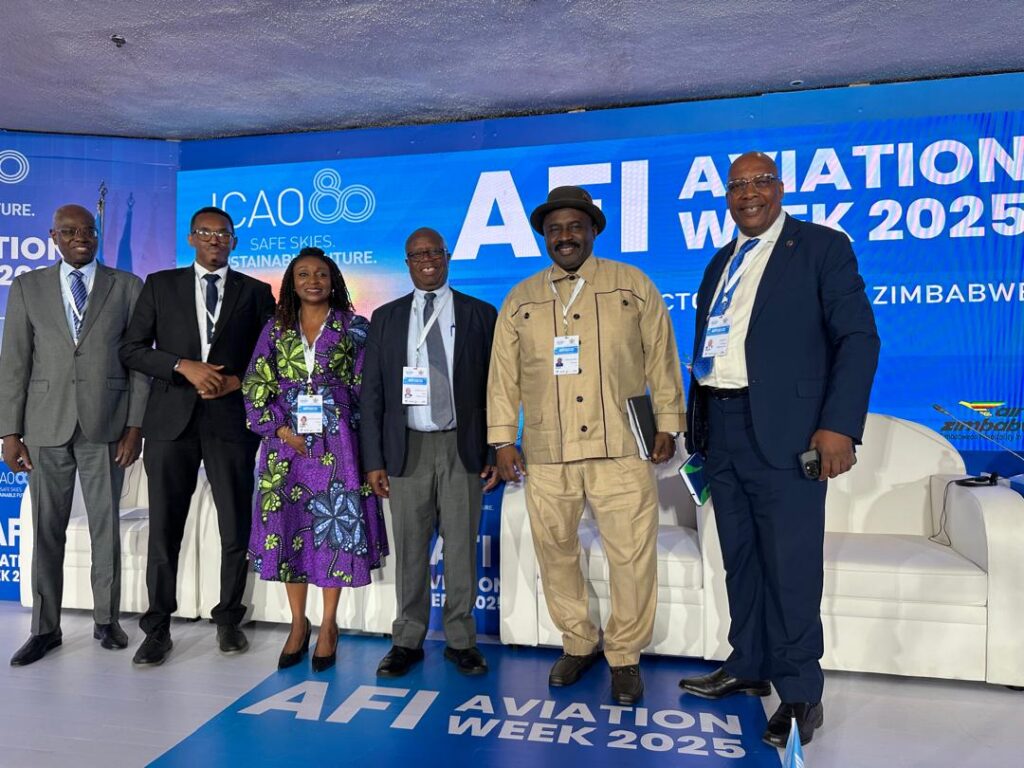Nigeria Becomes Model for Global Competitiveness as Tinubu’s Aviation Reforms Take Centre Stage – NCAA DG NAJOMO

Nigeria’s bold aviation reforms under President Bola Ahmed Tinubu have positioned the country as a rising force in global air transport, the Director General of the Nigeria Civil Aviation Authority (NCAA), Captain Chris Ona Najomo, declared at the 10th International Civil Aviation Organisation (ICAO) Africa and Indian Ocean (AFI) Aviation Week Symposium in Zimbabwe.
Speaking during a highly anticipated Q&A session at the prestigious Elephant Hills Resort in Victoria Falls, Captain Najomo held delegates spellbound with a compelling breakdown of Nigeria’s transformational strides in the aviation sector, attributed directly to the vision and execution of the Tinubu administration.
The symposium, themed “Optimising Air Transport Connectivity for Sustainable Economic Development in Africa”, provided a platform for aviation leaders across the continent to address key policy and infrastructure challenges facing African States.
Responding to questions on the persistent tension between national carrier protectionism and liberalisation, Najomo observed that while many African governments view national airlines as symbols of pride and sovereignty, the resistance to liberalising skies remains a major hurdle.
“Liberalisation is best for interconnectivity, but protectionism remains rife due to concerns over market share and profitability of national carriers,” he explained. He also highlighted the slow implementation of the Yamoussoukro Decision and the Single African Air Transport Market (SAATM), adding, “Many African States delay full implementation due to fears of losing control over certain routes, impacting their carriers negatively.”

He further noted that the absence of autonomous Civil Aviation Authorities and robust economic regulations in some countries continues to hinder the adoption of globally accepted practices in air transport liberalisation. Visa barriers, he added, also restrict the benefits of liberalised travel, weakening intra-African tourism and trade.
Najomo praised the Tinubu administration’s prioritisation of aviation infrastructure as a core pillar of national development and regional integration.
“In the last three years, Nigeria has made significant financial commitments to upgrade its aviation infrastructure. Terminal expansions are ongoing in Abuja, Lagos, Port Harcourt, Kano, and Enugu,” he said.
The government’s airport concession programme, driven through Public-Private Partnerships (PPPs), is also geared towards improving efficiency and service delivery at key international airports.
He further revealed the government’s development of new cargo terminals and free trade zones integrated with Special Economic Zones (SEZs), aimed at bolstering Nigeria’s export capacity. Plans for aerotropolis projects around Lagos and Abuja airports are also underway to stimulate tourism, logistics, and commerce.

On air safety, Najomo announced that the government is investing heavily in modernising air navigation services through the Nigerian Airspace Management Agency (NAMA).
These upgrades include the deployment of satellite-based Global Navigation Satellite Systems (GNSS), as well as radar and communication enhancements to improve air traffic control and regulatory compliance.
Nigeria’s commitment to continental air connectivity is evidenced by its active support for the Yamoussoukro Decision and SAATM. “We are signatories to multiple Bilateral Air Service Agreements (BASAs) and SAATM-compliant protocols, which provide unrestricted first to fifth freedom traffic rights,” Najomo said.
He added that Nigeria recently hosted the 18th Banjul Accord Group (BAG) plenary in Abuja, where regional aviation ministers reaffirmed their resolve to implement SAATM. Nigeria has also signed multiple Memoranda of Understanding (MoUs) with neighbouring countries on Air Traffic Flow Management and Search and Rescue.
Turning to the domestic front, Najomo stated that the Tinubu-led government has implemented several policies to support local airlines, including the “Fly Nigeria Act,” which mandates government-sponsored travel to be routed through Nigerian carriers.
“Nigeria has also domesticated the Cape Town Convention in the Civil Aviation Act 2022 and signed the Irrevocable De-registration and Export Request Authorisation (IDERA) in 2024. This significantly boosted Nigeria’s compliance score on the Cape Town Convention index and led to its removal from the Aviation Working Group’s watchlist,” Najomo said.
These regulatory improvements have opened access to aircraft leasing for Nigerian airlines, boosting their operational capacity and regional competitiveness.
Najomo concluded by emphasising that the Tinubu administration sees aviation not just as a means of transport but as a strategic enabler for economic growth, tourism, regional cooperation, and investment.
“One of the Honourable Minister’s core priorities is human capacity development across the aviation value chain. Nigeria is positioning itself as the gateway to Africa, and our policies are tailored to attract investment, ensure safety, and stimulate innovation within the sector,” he asserted.
The session closed with wide applause, as delegates recognised Nigeria’s aviation trajectory as a model worthy of emulation across the continent.







